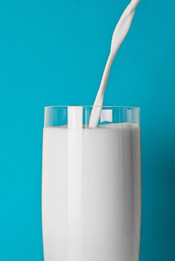Full fat milk – the key to limiting acne breakouts?

Acne is one of the most common long term skin conditions that can affect many of us at some point in our lifetime. Although most common in teenagers, it is possible for infants and adults to develop acne if they are experiencing a hormone imbalance. Acne is brought on by changes in hormone levels, with the changes causing the grease producing glands on the skin to produce more grease which settles into pores, clogging them. Until recently it has been argued that dairy is one of the main food groups that can lead to acne. However, this may not necessarily be the case.
It may be time to ditch the skinny lattes and opt for the full fat option instead for our morning coffees. A recent study conducted by Penn State College of Medicine has concluded that there is no link between full fat dairy and an increase in skin problems. The study, which looked at the impact full fat dairy has on acne sufferers, found that it was in fact skimmed milk and non-fat milk that were the true culprits when it came to encouraging an acne breakout.
US dermatologists sought to get to the bottom of the frequently pondered notion that dairy does encourage acne. By monitoring the daily dairy intake of 225 teenagers, it was found that there was a clear increase in cases of acne in those who consumed low fat dairy as opposed to full fat. Although the researchers have stated that their findings are not one hundred percent conclusive, it is clear that there is some correlation between the consumption of low fat milk and acne breakouts.
The researchers went on to discuss the benefits of consuming full fat milk, “Milk fat, although containing saturated fats, also contains numerous medium-chain fatty acids beneficial in promoting healthy metabolism and decreasing insulin resistance… Dairy fat also contains bioactive branched chain fatty acids, conjugated linoleic acid and the monounsaturated fatty acids, oleic acid and trans-palmitoleic acid…All have been shown to benefit metabolic profiles.”
If you are living with acne and you want to share your hints, tips and story, please do join in the conversation on our talkacne forum. To read more of our articles on acne, please visit our talkacne page.
You can find the full study on the Journal of the American Academy of Dermatology website.
Information contained in this Articles page which doesn’t state it has been written by talkhealth, has been written by a third party, who has not paid to be on the talkhealth platform, and has been published with their permission. talkhealth cannot vouch for or verify any claims made by the author, and we do not endorse any specific products, brands, or treatments mentioned. The content in our Articles pages should not be considered a substitute for medical advice. You should always seek medical advice before changing your treatment routine.
Next review: 14 June 2021

